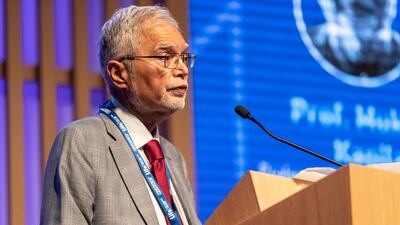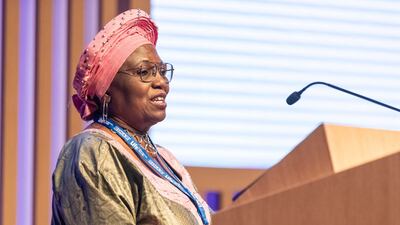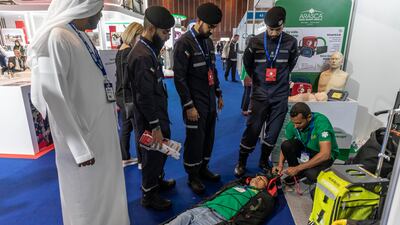The global energy crisis has exacerbated the challenges facing humanitarian organisations, a Dubai conference heard on Monday afternoon.
Rising fuel and energy costs have created an environment where the risks to the most vulnerable were amplified, meaning access to basic human needs such as heating, lighting, cooking and sanitation for refugees are being compromised.
“The life support for populations of humanitarian concern is extremely energy intensive,” said Prof Mukesh Kapila, from the University of Manchester and former undersecretary general with the International Federation of Red Cross and Red Crescent Societies (IFRC).
Speaking at the Dubai International Humanitarian Aid and Development (Dihad) conference, Prof Kapila said energy was crucial when it came to basic survival.
“There is a danger that the energy crunch caused by the situation between Russia and Ukraine is going to leave people behind.
“Access to basic needs like food, shelter and sanitation is impossible without having consistent and safe energy,” he said.
With the latest UN figures suggesting there are more than 100 million refugees in the world, the crisis could not have come at a worse time, he said at Dubai World Trade Centre on the first day of the conference.
Effect of war on oil prices
Russia’s invasion of Ukraine and sanctions from western countries have led to pressure on oil and petrol supplies.
Petrol prices soared to their highest rate in years during 2022, while the cost of oil surpassed $120 a barrel.
Household energy costs have almost doubled since the invasion began in February last year, according to a study from the World Economic Forum released last month.
The situation is even more dire in sub-Saharan Africa where the costs have almost tripled, according to the same report.
“There is a minimum of 100 million people who are classified as refugees and displaced right now but I believe that’s an underestimation,” said Prof Kapila.
“It’s up to humanitarian agencies to provide relief but the packages being provided are not catching up with what people need.
“It’s estimated that only up to 30 per cent of the energy needed is being provided by humanitarian agencies.”
He warned this has led to a situation where many refugees and displaced people have had to forage for themselves, leading to some desperate decisions.
“One consequence is that a large proportion are missing their meals,” he said.
“In other instances they are eating uncooked or poorly prepared rations and are unable to get the full nutritional value.
“A quarter of the average income of a refugee goes towards sourcing energy requirements.”
Burning toxic materials
Prof Kapila warned that it was not only what was being consumed that was causing problems to the health of refugees.
“Many refugees do not have access to electricity and will make do with whatever they can,” he said.
“They will often make a fire with whatever rubbish they can find, including plastic and rubber which create toxic fumes.”
The World Health Organisation has estimated that 20,000 displaced people die each year from indoor pollution.
The issue with sub-Saharan Africa is compounded by the fact that almost four out of five people there do not have access to electricity, said another expert at Dihad.
“There is an urgent need for greater investment in developing renewable energy resources,” said Yvette Stevens, former director of the UN Office for the Co-ordination of Humanitarian Affairs.
“It is estimated that in Africa alone, some $120 billion a year is required through to 2040 to ensure that all electricity requirements are met.
“Public and private partnerships and investment are crucial in this regard.”










